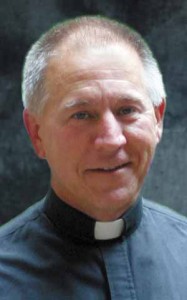By Father Bud Grant
When in the Course of human events, it becomes necessary for one people to dissolve the political bands which have connected them with another, and to assume among the powers of the earth, the separate and equal station to which the Laws of Nature and of Nature’s God entitle them, a decent respect to the opinions of mankind requires that they should declare the causes which impel them to the separation.
—“Declaration of Independence,” Thomas Jefferson et al

Notice the unambiguous reference to natural law which declares, among other things, that laws of nature are derived from God, that through them we are “entitled” to self-government and that among its “self-evident” tenants are the equality of all people and our “unalienable rights.” What would Thomas Aquinas say?
By the 19th century natural law theory had drifted far from Thomas’ interpretation. Neo-scholastic interpreters had been over-zealous in writing “manuals” that sought to spell out “The” correct moral choices as if they were writing a rule book for football referees. The mistake was conflating the universal and necessary primary principles of natural law with those secondary principles which are always time and place contingent. This over-reach smacks of mistrust of the ability of the individual moral conscience to arrive at one’s own conclusions, as if we should do what we are told unquestioningly. This is the very antithesis of Thomas’s insight. Deist philosophers of the Enlightenment, already deeply suspicious of Catholicism, rightly dismissed this as foolish. They derived their natural law principles from the Stoics.
Stoicism, however, created its own problem by arguing that virtues are derived from nature. This is a category mistake. Thomas could have explained to them that while God is the “God of nature” the laws of nature are not moral laws from which self-evident and unalienable moral truths are derived. The good of nature means order and its laws are known through physics, chemistry, biology, etc. But questions of truth, beauty, and good, such as when, for example, to rebel, must be left to what Thomas calls “practical” reason, discernment of moral good and evil. By conflating the two categories Stoics insist that once reason has worked out the natural principle, it must be acted on: morality is no less determined than gravity.
Thomas’ solution can only be projected here: cultivate moral virtues through taming passions in the pursuit of the common good. The resulting moral character can be trusted as our moral compass. In stark contrast with the defensive and mistrustful manualists and the stoic free will deniers, Thomas exudes great confidence in his sisters and brothers and great hope in the Church.
For now we can conclude that we should avoid the lazy temptation of manualist abrogation of our moral decision making, just as we should reject the stoic claim that morality is determined. Moreover, since even the wisest moral teachings derived from the secondary principles of the natural law are time and place specific, we have a compelling moral duty to re-assess them, especially those which seem to be axiomatic, especially those which derive from another age or another situation.
In our age, where the most contentious and divisive moral arguments are still being asserted on the basis of natural law, we are well reminded to be prudent and temperate in making truth claims and to re-evaluate them in light of our own unique situation and against the primary principle of the natural law especially, after all, since decent and rational people seem to disagree. It is worth noting that in the first sentence of the Declaration Jefferson expresses his intention to explain why it was morally good to rebel. He knew that he needed to make a solid rational argument out of “decent respect” to people of good will. More importantly, he assumed that people ARE of good will, even those whom he resisted. How uncommonly decent.
(Father Bud Grant is an assistant professor of theology at St. Ambrose University in Davenport.)







